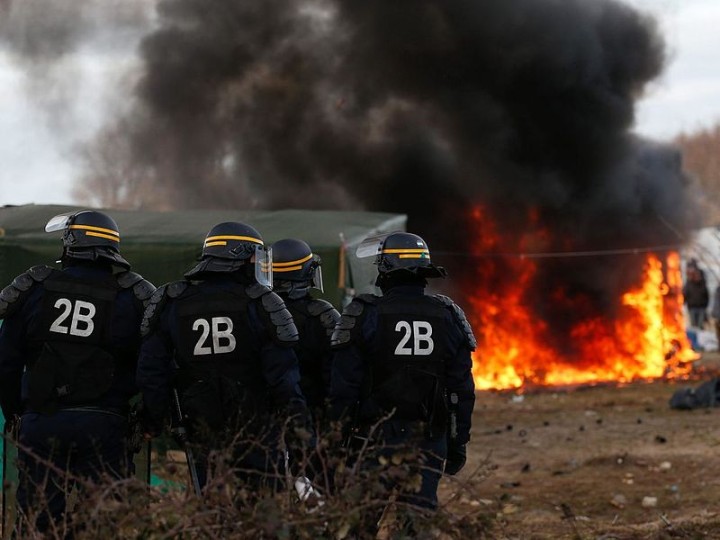Police attacked refugees with tear gas, water cannons, and stun grenades while dismantling the refugee camp in Calais and refusing migrants entry into Macedonia
by Nika Knight, staff writer for Common Dreams
“The jungle burns,” reported Germany’s Die Zeit on Tuesday. French authorities in the northern prefecture of Calais began their planned demolition of part of the sprawling refugee camp known as “the Jungle” on Monday, and continued into the next day despite protests and clashes with refugees and humanitarian groups.
“While the current situation in Calais is clearly unsustainable, evictions are no solution to a crisis on which the French and British governments have turned their backs for years,” said John Dalhuisen, Amnesty International’s Europe and Central Asia director. “The authorities need to look at this situation holistically: not just out of concern for border-management, housing and hygiene. Each of these individuals has needs and rights that must be protected.”
Residents burned their shelters and sat atop shacks and lean-tos in protest of the government’s actions, and riot police in turn attacked the refugees with water cannons and tear gas in an attempt to disperse them.
“This is not the way to solve the refugees problem,” Maya Konforti, a volunteer for a humanitarian group, told the New York Times.
Police on the Greece-Macedonia border also on Monday used tear gas and stun grenades to stop people from crossing into Macedonia.
The Balkan state has followed Austria’s example and severely limited the number of refugees it is allowing inside the country, prompting the #SafePassage campaign from humanitarian groups who say that European countries are violating human rights and international law by closing their borders to refugees.
Tens of thousands of refugees have been trapped in the Greek border town of Idomeni since Macedonia largely closed its borders to migrants last week.
The Washington Post reported that most of the asylum seekers trapped in Greece are women and children.
In a series of tweets, the United Nations High Commission called for better treatment of refugees and improved coordination between EU member states to deal with the crisis.
Greece, overwhelmed by an influx made worse by neighboring countries’ refusal to allow refugees entry, is asking the European Union for millions of euros in emergency funds, France 24 reported:
“Greece has submitted an emergency plan to the European Commission … corresponding to around 100,000 refugees,” government spokeswoman Olga Gerovassili told reporters, with the requested aid totalling 480 million euros ($534 million).
“We cannot bear the strain of all the refugees coming here,” Gerovassili added.
“The surge of the vulnerable comes at the worst possible time,” the Washington Post observed. “Just as European nations are barring their doors and 25,000 refugees are suddenly trapped in near-bankrupt Greece, a country that was once merely an entry point.”










